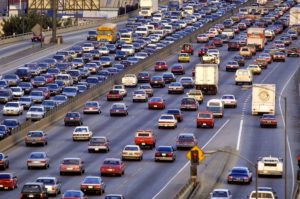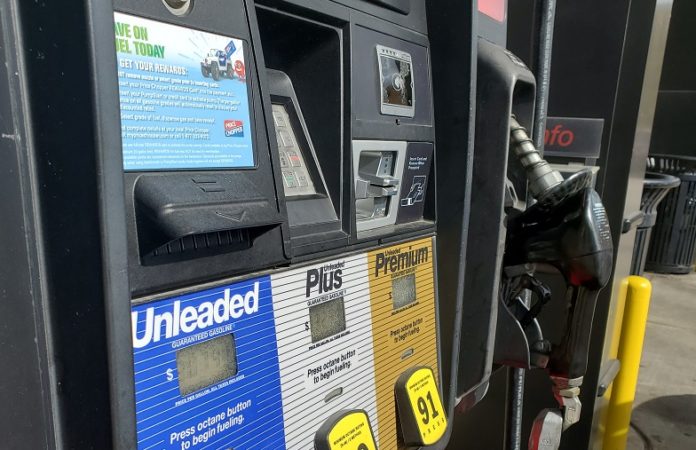The days of paying gas taxes at the pump may eventually be as passé as using a landline to place a phone call.
States across the country are studying new ways to tax the driving public for transportation as gas taxes become less sustainable with more fuel-efficient and electric vehicles on the road.
At least 10 states have passed legislation to study what’s known as a road-user charge.
Many are already looking at how they could move to a tax based on miles driven as compared to how much gas a driver buys.
Kansas is now dipping its toe in the road-user charge debate with a statewide survey to learn what Kansans think about how highways and bridges are funded.

The survey is the first step toward a road-user charge study that will examine how the idea would work in the Midwest.
“This is not a new concept,” said Transportation Secretary Julie Lorenz.
“It’s been explored and worked on on both the East and West coasts,” Lorenz said.
“We just haven’t really had much conversation about it in the Midwest,” she said.
For the last decade, the idea of taxing drivers based on how much they drive has proven to be a complex, if not controversial, topic.
A road-user charge raises concerns about privacy – how mileage driven would be tracked – and whether it disproportionately affects rural residents who have to drive farther than urban motorists who are closer to their everyday needs.
The state Transportation Department is taking a cautious approach to the topic, starting first with a survey of Kansans that will lead to focus groups that will be drawn from different regions as well as various interests such as business and agriculture.
“What we’re trying to do is introduce the concept and start the conversation in Kansas and for us understand where people’s comfort level is,” Lorenz said.

The goal is to let Kansans design what the study will look like and how mileage driven can be recorded, whether it’s with a pen and paper, a mobile app or an on-board device that’s been used in studies elsewhere.
“We want to make sure we give people good options,” Lorenz said.
“We’re open to Kansans helping shape the technology of recording where you’re driving,” she said.
Transportation planners expect to spend the next year working with the public in designing what the actual road-user charge pilot will look like.
They don’t expect to actually start testing a road-user charge until 2023.
While other states have studied road-user charges, Kansas transportation officials stress that they’re taking a different strategy by allowing the public to decide what technology should be used to record mileage driven.
“We’re taking the approach of talking with folks and having them help us craft what the actual pilot looks like,” said Maggie Doll, chief of staff at the Transportation Department.
The nation’s highways are paid for in various ways, including fuel taxes, vehicle registration fees and state general fund revenues, among others.
The federal gas tax, set on a per-gallon basis, hasn’t been raised since 1993, and the revenue it generates is insufficient to support the transportation programs authorized by Congress since 2008, the Congressional Research Service reported in 2016.
Increases in vehicle fuel efficiency and wider use of electric vehicles raise questions about the long-term viability of taxes as a means of funding transportation.
The Kansas gas tax is 24 cents a gallon, and it was last raised in 2003.
Currently, state gas taxes make up about 21% of the revenues that pay for Kansas roads, with sale taxes comprising the largest part of the revenue pie at 38%.
By 2045, transportation planners expect state gas taxes to contribute to 11% of highway revenues with 60% coming from sales taxes.
A 2019 report compiled by a task force made up of lawmakers and representatives of the transportation industry recommended investigating funding alternatives, including a fee based on vehicle miles traveled.
“We all know that the gas tax isn’t sustainable long term,” Lorenz said. “It’s going away. We have to find other methods for supporting transportation.
“Is it a road-usage charge? If it is, how would that be fashioned in the heartland?”
In the last decade, a number of states started experimenting with collecting revenue directly from drivers based on their travel with the idea that motorists should pay based more on how much they travel than the fuel they buy.
The University of Iowa’s Public Policy Center studied a mileage-based user charge a decade ago in which on-board computers with global positioning systems were installed in the vehicles to record mileage.
The study involved 2,650 volunteer drivers in 12 locations throughout the country, each driving an average of 9,000 miles during the two-year study that ended in 2010.
The Iowa study, the first to examine road user charges on a national and multijurisdictional scale, found that 92.5% of all driven miles were successfully measured by both the GPS and the onboard diagnostics system.
Throughout the study, participants were given a series of questionnaires to evaluate how accepting they were of the move away from a fuel tax and the tradeoff between privacy and billing statements.
At the start of the study, 41% of the volunteer drivers were somewhat or very positive about the idea of replacing the gas tax with a tax based on vehicle miles driven.
By the end of the study, 70% had a positive view of shifting to a road-user charge.
Four years ago, a study done in California found 73% believed that taxing by the mile was more equitable than a gas tax.
Further, the study found that 87% of participants found the pilot to be easy and 85% were overall satisfied with the pilot, and 91% expressed willingness to participate in another road charge pilot.
Four years ago, Colorado concluded a study of road-user charges involving about 150 volunteer participants.
The study, which examined three different mileage reporting options, found that about a quarter of the participants thought it would either interfere with their privacy or penalize drivers who buy fuel-efficient vehicles.
About 62% of the Colorado study participants thought the road-user charge would not properly track mileage from anyone outside the state who use state highways.
About 44% agreed that a road-user charge would affect all people in equally. Others who thought it would not affect all drivers thought rural residents would be disproportionally affected.
Minnesota also examined road-user charges with about 500 participants who used specialized Android smartphones with a preinstalled mileage fee application specifically designed for the pilot.
The smartphones had to be in the vehicle, and they communicated with a device plugged into the on-board diagnostic port to verify the phone was in the correct vehicle.
The phones used GPS to determine location and mileage and transmitted study information through the cellular network.
Researchers reported that drivers didn’t express fear about a lack of privacy because they already thought that they gave up their privacy to mobile phone service providers.
“Instead, participants worried that their data would be vulnerable to access by wrongdoers who would seek to misuse the information,” the study said.
“They wanted reassurance that their data could be safely held by the state, such
as in the form of a security certificate program.”
Oregon implemented the country’s first road-user charge system that is available on a voluntary basis in which drivers pay 1.8 cents per mile traveled.
Oregon uses odometer readings with a plug-in device to collect the tax.
Drivers can choose between a device with no GPS that tallies charges for all miles driven or a device with GPS that tallies only miles within the state.
Each vehicle’s mileage is sent to an account manager, who then bills the drivers.
Lorenz said KDOT is trying to do the study in a way that’s sensitive to any reservations about privacy, noting that only volunteers will participate.
“Certainly, privacy is a concern,” she said. “We are working hard to make sure we address that right up front.
“The study is taking a long time because we’re trying to do it in a way that’s systematic and we bring people along,” she said.
Republican state Rep. J.R. Claeys, a member of the Senate Transportation Committee, hopes the study will address how to deal with the increasing number of electric vehicles on the road.
“The study should provide the Legislature with options for assessing electric vehicles that respect privacy and charge based on use, similar to gas vehicles that pay at the pump,” Claeys said.
Democratic state Sen. Jeff Pittman, another member of the Senate Transportation Committee, praised the agency for its cautious approach to the study, especially since it involves a fundamental shift in how roads are financed.
“I do believe that it’s important that they engage Kansans on their thoughts before they get too far down the road,” Pittman said.
“I do think, though, that it’s going to take a big lift to understand realistically how they would be implemented ”














